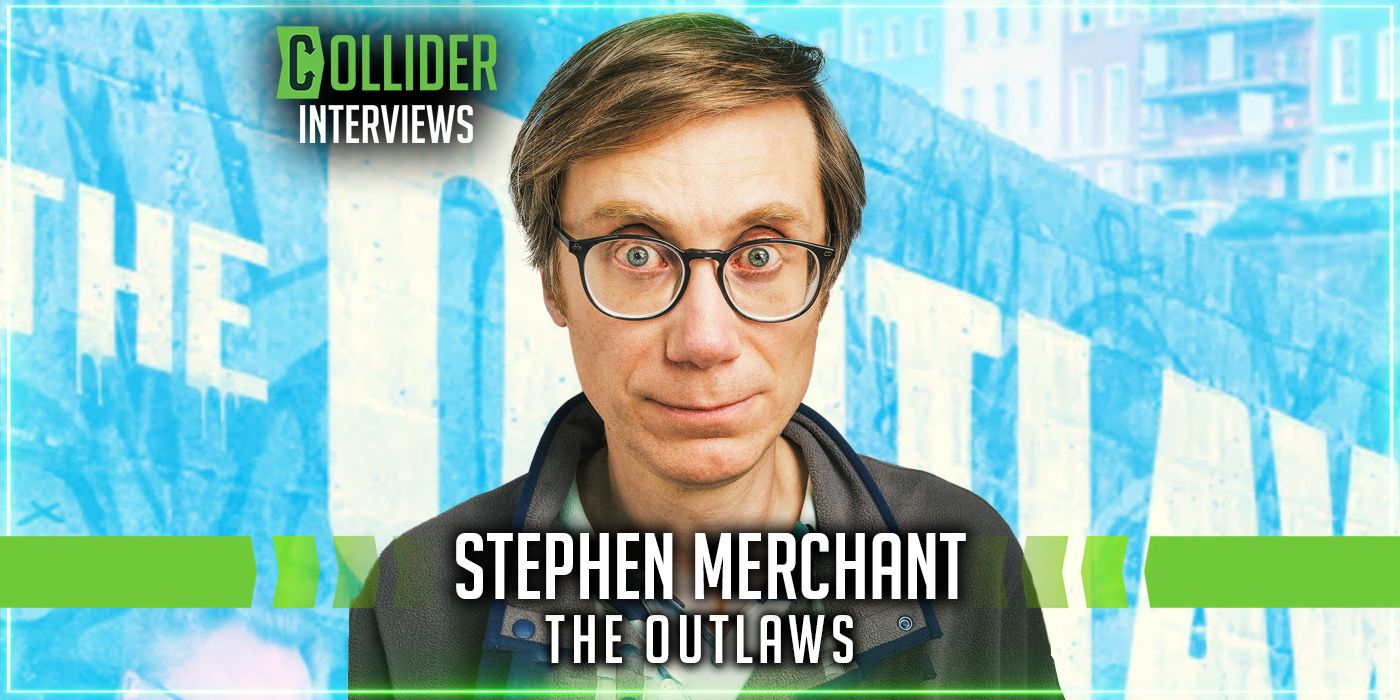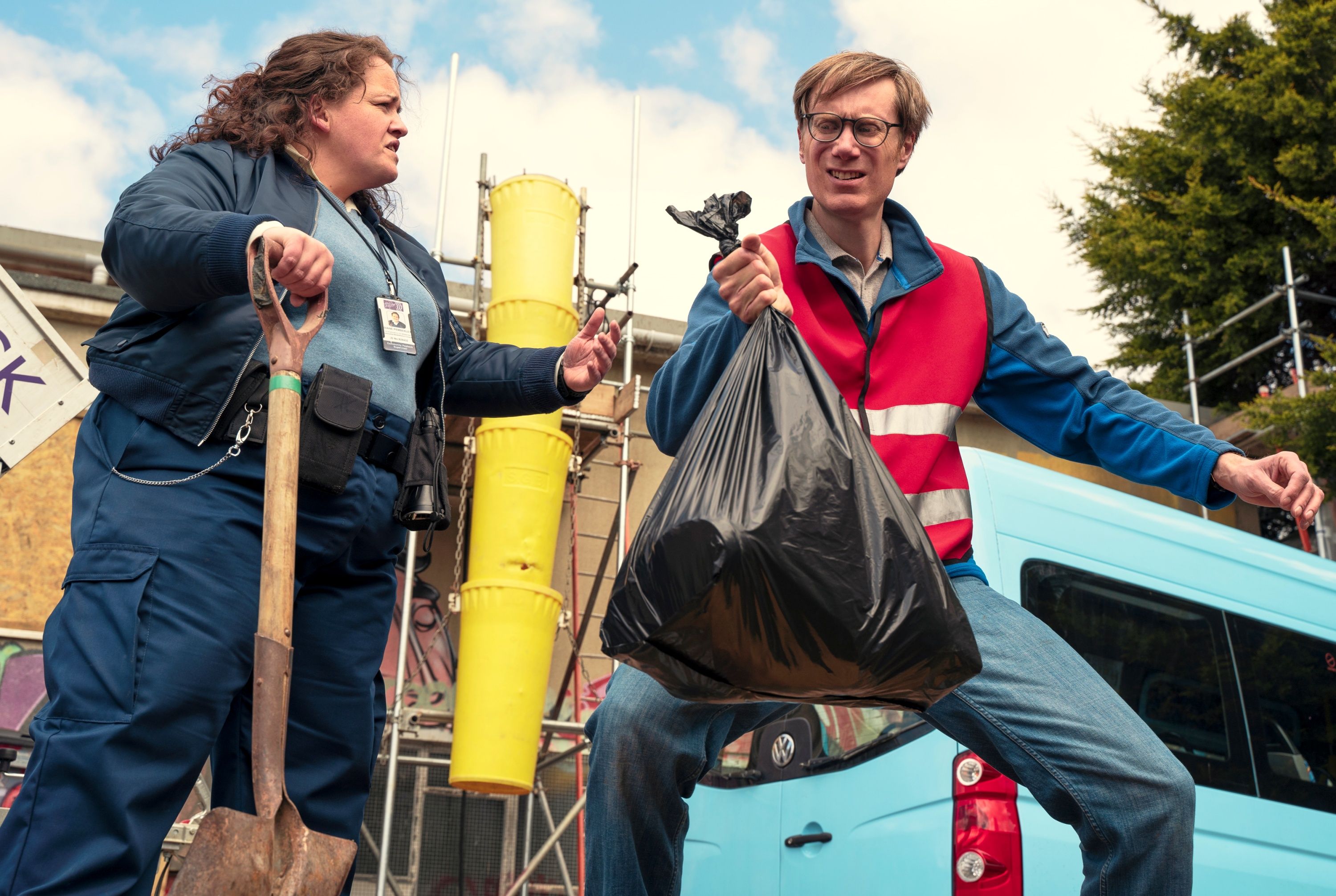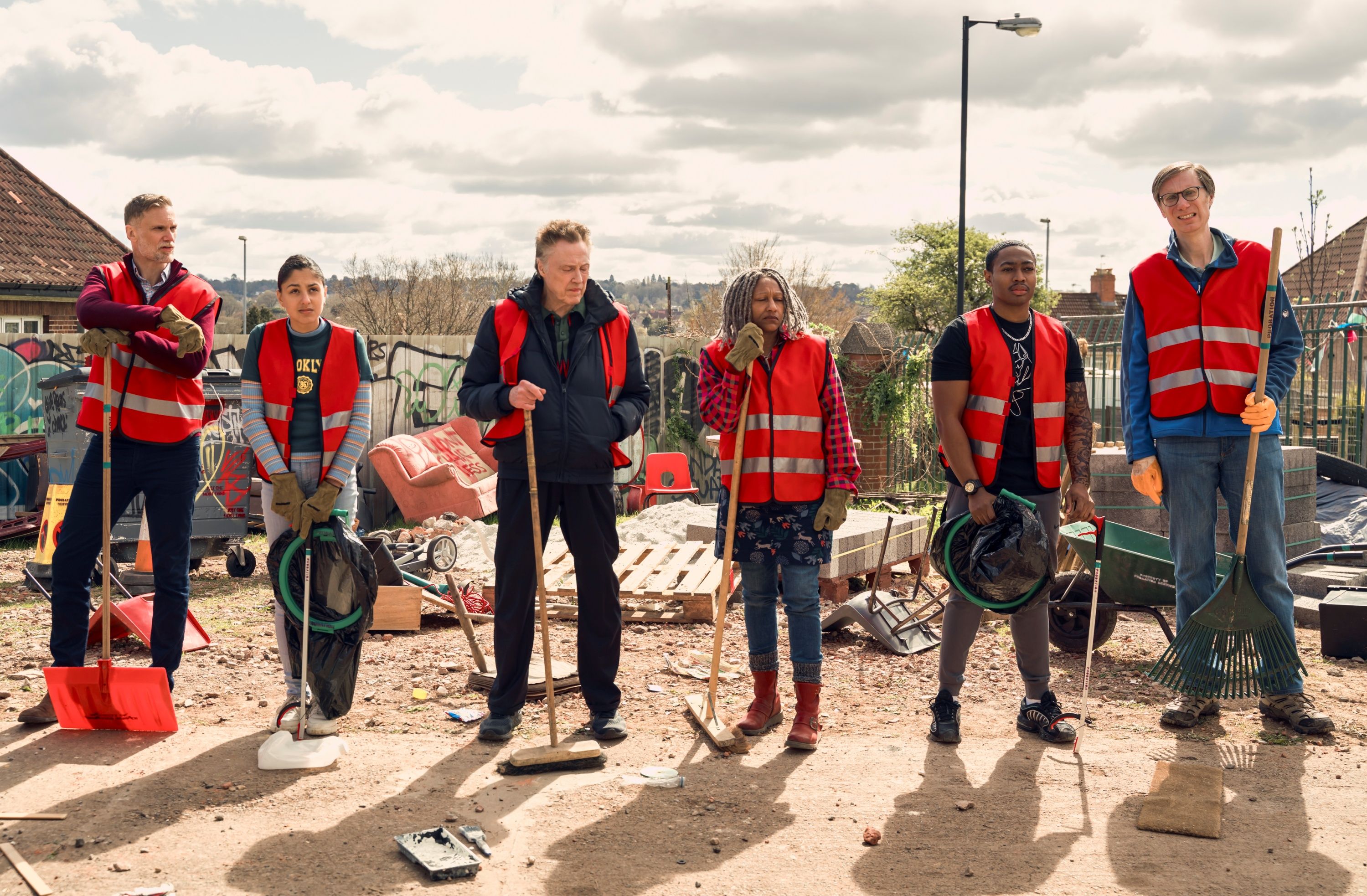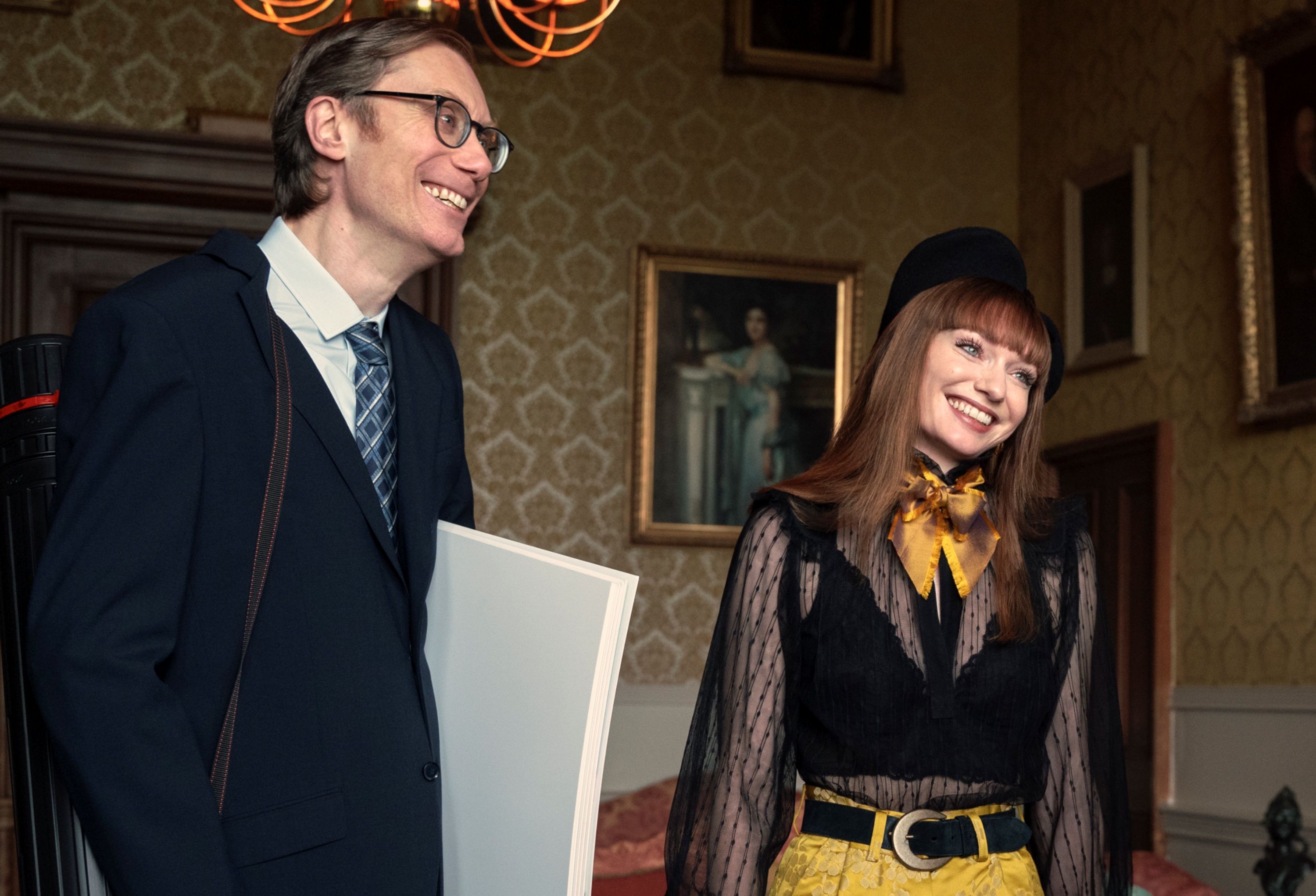From co-creators Stephen Merchant and Elgin James, the six-episode crime thriller comedy series The Outlaws (which has already shot a second season) follows a group of individuals, each of different ages and from different backgrounds, who have all done things that put them on a path that ended with them working to complete a community service sentence together. They start as seven strangers, but quickly learn how much they actually have in common, which bonds them in a way that inspires them to be there for each other, even if that leads them on a dangerous journey.
During this 1-on-1 interview with Collider, writer/director/executive producer/star Merchant (who plays an unsuccessful lawyer named Greg) talked about how he realized what a success the series was, how he ended up collaborating with James on the project, striking a balance between humor and drama, the real-life inspiration for his character’s backstory, how his height is one of his comedy superpowers, the challenge of wearing so many hats on this, and possible plans for a Season 3.
Collider: This show is so much fun. I just had the best time watching it. Congratulations on the first season being the BBC’s biggest comedy launch in 2021 and getting to do a Season 2. That’s cool, no matter how you look at it.
STEPHEN MERCHANT: Yeah, thank you so much. I appreciate it.
When did you realize that the show was such a success and was really connecting with viewers? Does someone call and give you the news? Do you start to hear a lot of social media comments? How do you find out that sort of thing?
MERCHANT: This was the first project I’ve done, where I did start to get a real response from social media, that it was connecting with people. In the UK, the show aired week to week, unlike on Amazon, where it drops all at once. I don’t think we anticipated how much the audience would engage with the characters and would take them under their skin. We imagined that it was a show in which you might root for one or two characters, but perhaps you would dislike the others. It was interesting how people were beginning to connect with characters that they would otherwise perhaps not have liked or engaged with, normally. It’s a very disparate group of people who are from different sides of the political spectrum. People seemed to be engaging with the characters and empathizing with them and understanding them, which was one of our hopes for the show, but it was very pleasing to get that feeling on social media that it was working.
How did you and Elgin James come to work on this together? You guys seem like this unlikely pairing, but I also absolutely love it, so how did that happen?
MERCHANT: It’s interesting you say that because Elgin always says that, in a way, seeing us together is a poster for the show, in a sense, because the show is about unlikely groups of people finding common ground and finding connection. As you say, Elgin comes from a very different background to me and a very different life story. When we met, I had a very vague idea for this show about people doing community service. I asked my agents, “Put me in touch with someone who you just think is from the completely other side of the tracks to me,” and they introduced me to Elgin, and we just hit it off. We found immediately, despite our very different life stories, that we had so much in common. We liked the same things, we disliked the same things, we had a shared sense of humor, we had a shared sense of worldview, and we just started spitballing from there. That was what we were trying to capture in the show as well. It’s about how very disparate groups of people can find common ground, if they get to know each other.
I love that this is a very funny show with outlaws at its core because usually with a story like this and characters like these, it’s much more serious. What was it like to balance that tone, so that you had the comedy, but you also are clearly conveying the seriousness of the actions of some of these characters?
MERCHANT: I’m always a fan of shows and movies, which can try to strike a balance between humor and drama and can feel like they exist in the real world. As Elgin and I were talking and sharing stories, and he was sharing stories from his own life, some of which were quite bleak in many ways, there was always humor in them and the way he relayed them always had humor. Even in moments of desperation or tragedy, there can be something comic in it. Some of my favorite shows, like The Sopranos, people forget how funny that show could be. There’s that great episode, “Pine Barrens,” where Paulie and Chris get lost in the snow, trying to kill a guy, and Paulie loses his shoes. It’s very funny and it’s almost Samuel Beckett and the Theater of the Absurd. It’s very funny, and yet it still lives within The Sopranos universe. I like that idea of something that can be funny, but also thrilling or suspenseful, like a Hitchcock movie. I like that idea of trying to juggle tones and genres and flavors, all in one show.
Your character probably has the most awkward backstory, for what got him into the situation that he’s in. At any point, did you regret giving yourself that backstory, since you’re ultimately the one responsible for making that decision?
MERCHANT: I don’t know if you remember, but there was a particularly famous English actor who got caught with a lady of the night in Hollywood.
Of course.
MERCHANT: Well, when I read about it, I discovered that the way that my character gets caught was the same way that he got uncovered, which is by accidentally hitting the parking brake on his car while he was parked, and it was flashing and the police saw it and went to investigate. It’s that Theater of the Absurd. It’s another example of where, on the surface, it sounds like something we’d just made up, but actually, it was drawn from real life. I’m sure for him, in that moment, it was an absolute nightmare and tragedy, but when you look at it, years later, it just takes on an absurd comic quality. I quite like leaning into that. I’m not embarrassed to do that. That just seems like a funny, intriguing thing to play.
As a tall person, myself – I’m six feet tall – I always appreciate a good height joke, and you have a few of them in this series. Were all of those scripted? When you’re a tall person, who’s also a writer, do you just have endless height jokes that you reference and pull from, at any time?
MERCHANT: I ran into a very old comedy writer, called Barry Cryer, who wrote jokes for Bob Hope, back in the day. That’s how long he was around. And he gave me a height gag, when I just ran into him in the street, that I used in the show. They come out of nowhere. People feel like they can make height jokes. I was telling an anecdote at a party recently and someone said, “Oh, that’s a tall story,” and everyone laughed. I was like, “Would you make that crack, if I was a very tiny person?” People see it as an accomplishment, I think, so they feel like they can make jokes about it. I feel like it’s one of my comedy superpowers, really, being very tall, gangly and awkward, so why not play into that and magnify it for comic effect?
You write, you produce, you direct, and you star in this show? How difficult is all of that? What are the biggest challenges of wearing so many hats and what do you love about being so involved?
MERCHANT: I’m a Jack of all trades, master of none is what you’re basically saying. I read between the lines. Well, having done things in the past, where I was acting and also directing, it was normally quite easy because it was just me and one other person, and we were sat down. It turns out that when you start moving around, and you put seven or eight other actors in the scene, and you try to be a bit more ambitious, cinematically, then it’s very difficult. It was foolhardy and I would not recommend it. It was incredibly stressful, and I’m still recovering from it emotionally, so I would rather not talk about it anymore.
When you’ve had a cast like this together, do you cast yourself first, and then make sure you have chemistry with everybody else? How does that work, and how do you end up with Christopher Walken?
MERCHANT: One of the things that’s most enjoyable about this and what I love about this business is the casting process. The casting directors bring in people, some of whom you’ve seen before and others are completely fresh faces, and to see them bring the characters to life that were only on the page, for years beforehand, and to see them animate them and make them breathe, that’s really fun. That’s a really thrilling part of the process. And I think there are some terrific young actors that people won’t be familiar with this, as well as some more established actors, including Christopher, who’s just an absolute pleasure. There’s always that fear when you have an actor of his caliber and his vintage, that they’re a bit tired by this point in their lives and they’ll do one take, and then they’ll go back to the hotel. But he was still as passionate about acting, as I imagine he ever was. He always gave us a variety of performances and different tones, like a dramatic one and a comic one. He’s always happy to try another take and play around with it. He slotted into that world, even with these young, inexperienced actors. I hope that there’s a comradery to it. There’s an unlike Magnificent Seven quality to our ensemble.
Are there plans for a Season 3? It feels like there is still story to tell. Do you feel like you’ve told a complete story with two seasons, or do you want to do more of this?
MERCHANT: We only planned on one season, and then as we started shooting, like so many other productions, we got shut down because of COVID. While we were in that hiatus, I said, “Can I write another season?,” and they allowed me to. So, we actually came back with two seasons ready to go, and we filmed them, back to back. What was good about that was it gave us an opportunity to plant seeds in the first season that we could pay off in the second, which is something you don’t often get to do. And then, just recently, we started spitballing ideas for Series 3. I wasn’t sure, if there was enough juice in the lemon, as it were, to squeeze out, but it seems like there is, and we’ve really enjoyed leaning into ideas and breaking stories. Because we, as writers, have fallen in love with the characters, we feel like there’s so much potential for them and so many places to take them. Particularly once the actors have brought the characters to life, you really feel you can start writing for them and writing for the actors, and playing to their strengths and their chemistry. That’s the thing that I would like to do, if we do more.
The Outlaws is available to stream at Prime Video on April 1st.




